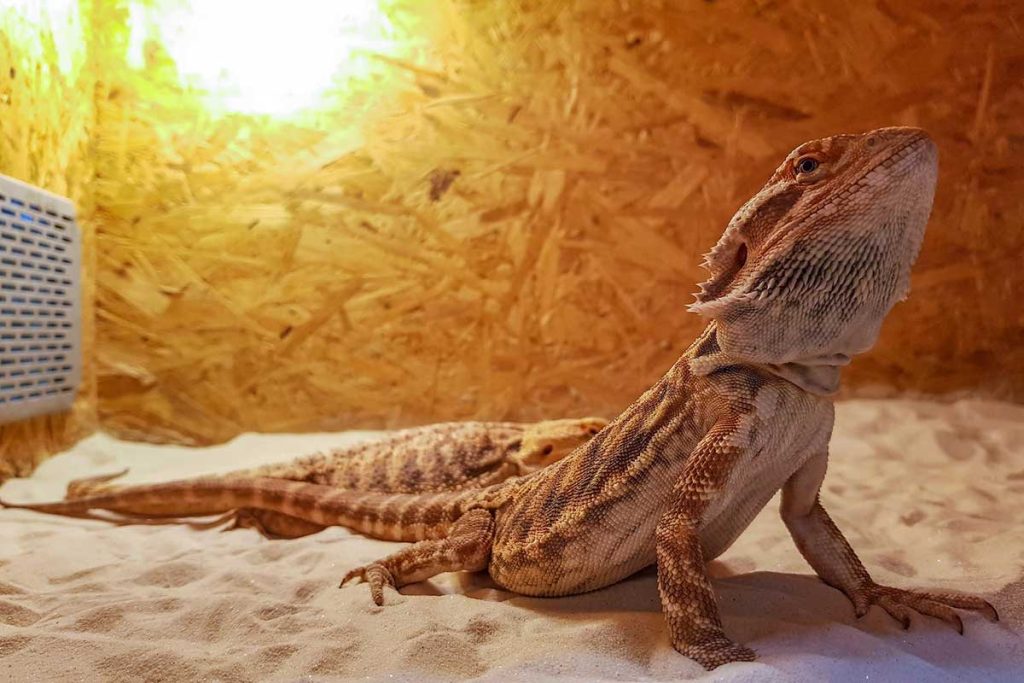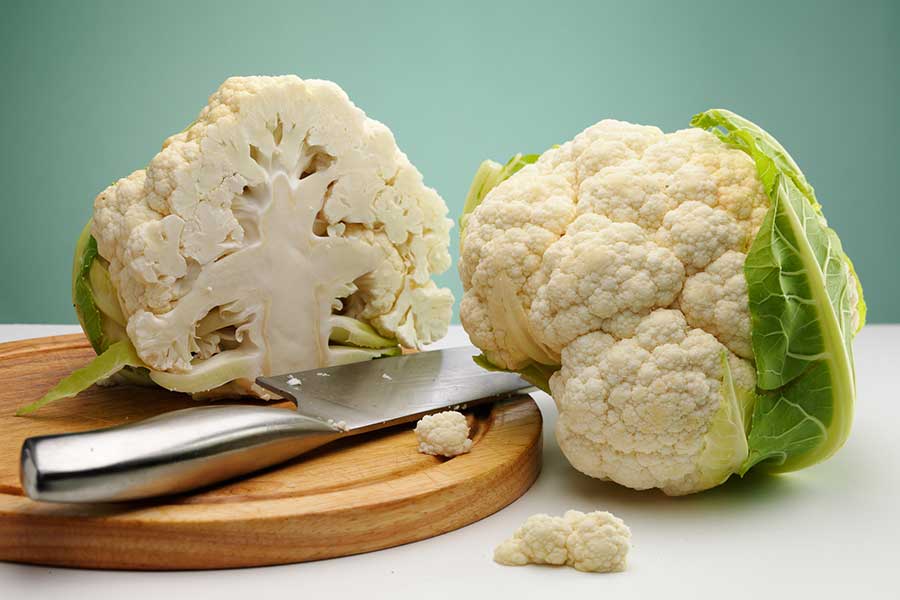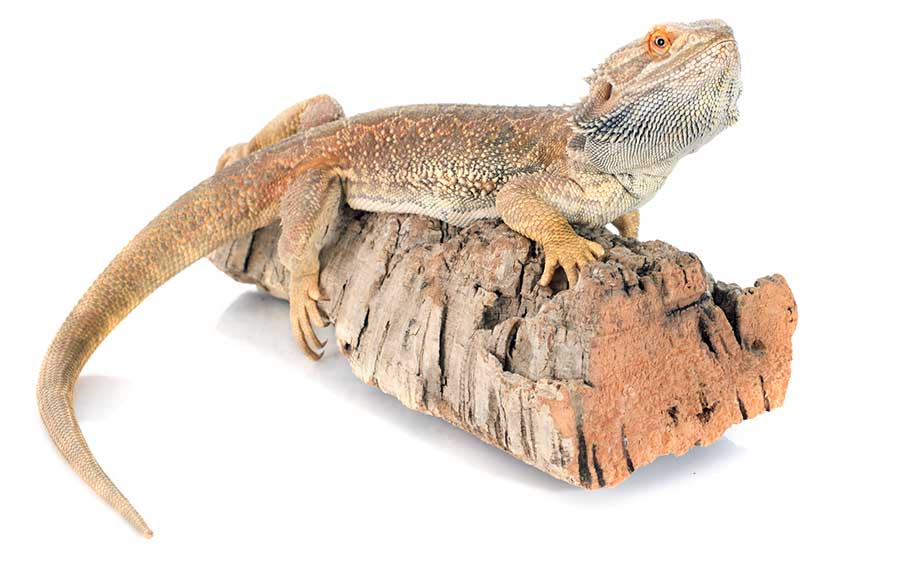Cauliflower has become an increasingly popular vegetable in recent years as a healthy and versatile food that can be used in just about everything from pizza bases to rice. But even though you love experimenting with this tasty veggie, it doesn’t necessarily mean your bearded dragon can eat cauliflower, too.
When it comes to the white part of the cauliflower (the head), eating a little bit is not dangerous for bearded dragons and other lizards. However, it should not be a regular part of their diet because it can strip their bodies of
So, while you don’t need to worry if your bearded dragon accidentally eats a bite or two of cauliflower, you shouldn’t be actively putting it in their bowls.
Cauliflower leaves, on the other hand, are a different story. They are a great source of
Let’s take a closer look at cauliflower and its leaves and what nutritional benefits (and drawbacks) they each present to your bearded dragon’s health.
Why Bearded Dragons Shouldn’t Eat Cauliflower
Cauliflower is a nutritious and versatile vegetable that humans should definitely be eating. It is full of fiber, antioxidants, and vitamins C, B6, and K.
The problem with cauliflower as far as beardies are concerned is that, just like Brussels sprouts, it contains lots of phosphorus. It actually contains about twice as much phosphorus as
This is a problem for beardies because they need lots of
To put things in perspective, hatchlings need about 650 mg of
calcium per day, juveniles around 1,100 mg, young adults about 1,300 mg per day, and adults around 1,500 mg per day.
Lizards that don’t get enough
Because insects don’t contain much
Beardies also need plenty of vitamin D3 in order to integrate and use the
Finally, cauliflower contains goitrogens, which can prevent your beardie’s thyroid from functioning properly if it accumulates enough in their system.
But What About Cauliflower Leaves?
While you shouldn’t be giving your beardie the white heads of cauliflower, the leaves make an excellent nutritional addition to their diet! Cauliflower leaves are full of the
Cauliflower leaves contain around 630 mg of
Additionally, cauliflower leaves contain a surprising amount of protein for leafy greens, around 5.9 grams per 100 grams, as well as a decent 2 grams of fiber for healthy digestion.
The leaves also contain a good chunk of iron for healthy blood, bones, and organs, folic acid for healthy tissues and cells, and potassium to regulate blood pressure and support the nervous system.
The biggest danger with cauliflower leaves is residual pesticides, which can seriously disrupt your beardie’s stomach even in very small amounts. Make sure to buy from suppliers that avoid pesticides and wash leaves thoroughly before popping them in your lizard’s salad.
It’s also worth noting that cauliflower leaves are a great choice when gut loading insects to give to your beardie! You can even add a powdered
What Is Gut Loading?
As we touched on above, cauliflower is an excellent veggie to use for gut loading your beardie’s feeder insects. Gut loading insects is the fairly simple task of force feeding the insects you plan to feed your lizard foods that are rich in essential nutrients, such as
And don’t worry — “force feeding” insects is not as difficult as it sounds, since most feeder insects they will gladly eat just about anything you put in front of them.
For best results, feeder insects should be gut loaded at least 24 hours before being fed to your bearded dragon, and they should be left no more than 72 hours before feeding to retain the benefits. This will ensure your beardie gets as much of those precious vitamins and nutrients as they possibly can.
You can read our complete bearded dragon feeding guide here.
FAQs About Bearded Dragon Diets
Can bearded dragons eat broccoli and cauliflower?
Neither of these vegetables’ heads are outright toxic to beardies, so you don’t need to worry if they eat a little bit of it, but neither should be a staple in your beardie’s diet.
Broccoli contains toxins that can be dangerous to your lizard if they eat it in large quantities, and cauliflower has a very poor
Cauliflower leaves, however, are very beneficial for beardies’ overall health and are safe to be used as a staple food.
What foods are poisonous to bearded dragons?
There are plenty of foods that don’t offer much nutritional value to lizards and therefore shouldn’t be eaten regularly. But some foods are actually toxic and can kill your lizard within a matter of hours if ingested.
Foods that are toxic and dangerous to bearded dragons include:
- Onions
- Chives
- Mushrooms
- Leeks
- Garlic
- Rhubarb
- Avocado
- Eggplant
- Iceberg lettuce
Always do your research before introducing foods into your beardie’s diet.
What vegetables can bearded dragons eat?
There are plenty of veggies that are delicious and healthy for beardies, especially dark greens.
Some of the best vegetables for bearded dragons include:
- Collard greens
- Mustard greens
- Turnip greens
- Bok choy
- Parsley
- Swiss chard
- Watercress
- Clover
- Red and green cabbage
- Cilantro
- Bell peppers
- Green beans
Find more information on the best greens to feed your bearded dragon here.
What is a bearded dragon’s favorite food?
Most beardies enjoy live insect prey much more than any vegetable you might choose to give them. They enjoy feeder insects like crickets, roaches, earthworms, locusts, waxworms, butterworms, and so on.
This is why, if you have a picky beardie, it can be a good idea to gut-load insects with
The Verdict
While you might enjoy baking cauliflower heads into various recipes, including pizza bases, cauliflower rice, and, of course, cauliflower cheese, it is not something that you should be adding to your beardie’s salad bowls.
Cauliflower heads don’t contain much
This veggie also contains fairly concentrated levels of goitrogens, which can undermine your lizard’s thyroid health. Essentially, while you don’t need to worry if your lizard accidentally eats a bit of cauliflower, it should not be on the menu regularly.
Cauliflower leaves are a different story. They are high in
In short, next time you go grocery shopping, feel free to stock up on cauliflower–but keep the heads for yourself and save the leaves for your beardie.
What superfoods do you like to feed your bearded dragon? Share your suggestions with the community in the comments section below.




